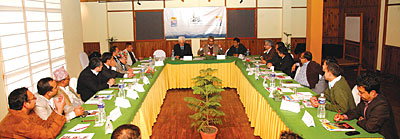 |
1. Learn to read, interpret and analyse the basic financial statements � cash flows, profit and loss statements and balance sheets � of a company. If you can add and subtract, you can pretty much learn all the accounting that you need to know to do your job.
Few Nepali business reporters seem to know how to take apart a company's financial statements, and they do their readers a great disservice when they lack this skill. Mastering basic accounting (and this can be done by taking a course for a month at any institute in Putali Sadak) is one way an ambitious reporter can differentiate herself when reporting on public limited companies.
2. Decide what kind of a reporter you want to be. If you want to be taken seriously, leave the lifestyle reporting to your less ambitious peers. Often, I see Nepali journalists being taken for a ride by CEOs and business managers. It's no use wasting your time interviewing business heads about their villages, their schooling, their favourite gym, the music they listen to, their spouses, their hobbies, their self-reported early struggles, and then using such details as the meat of your reporting.
When you ask a business manager to tell his story, his tendency is to put a nice spin on the story to make him a great hero, when the verifiable truth could be utterly boring. Sure, your publication needs those lifestyle stories to get the advertisements. Still, tread carefully. There is a line between being known for writing only puffery and for good reporting.
3. Do not rush to ask a banker or an accountant questions related to macroeconomics (GDP, trade, employment, etc). For macroeconomics, first ask several economists, who may well disagree with one another. Ask them for data and data sources. Ask them to explain their reasoning, and understand it yourself first. If the economists cannot explain their reasoning in clear, logical language, then don't be intimidated: chances are they themselves probably don't know what they are talking about, and are using jargon to fool you. Do not be intimidated by titles, fancy university degrees, and expert knowledge.
You'd be surprised how many so-called experts bluff about topics they have no idea about. In any case, your job, as a natural self-learner, is to translate the complicated world of business for your readers. So, push your 'ask follow-up questions' button repeatedly until you understand what is what.
4. Always ask yourself: how is this story in the interest of the reader? Always try to have that 'what do the consumers think' angle. This helps break 'big' stories down to the level of the 'ordinary' individuals who are your readers.
5. Never publish anonymous letters and allegations. In any town, there is no shortage of people who have scores to settle with one another. Often, they use you to get even with their enemies. You can add fuel to the fire, and revel in self-serving wah-wah. Choose a higher road: focus on your credibility for the long, long term.
6. Never write an entire report based on one person's remark or a press conference put out by a company that wines and dines you. Take a skeptical approach, dig deeper. Talk to analysts, competitors, suppliers, regulators, and report in ways that you'd be proud of five years from now.
READ ALSO:
Yeti comes home



